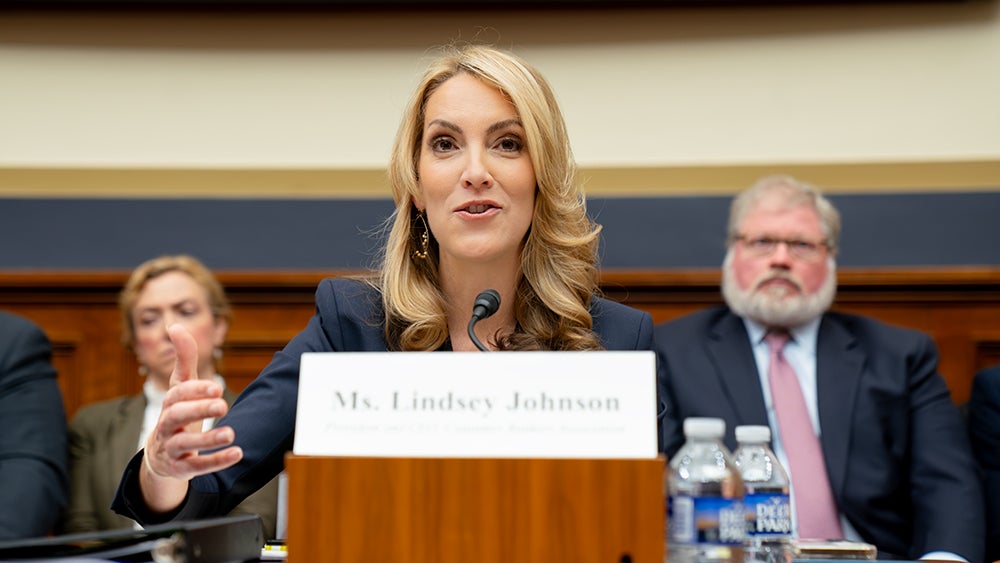CBA’s Johnson: “Banking Agencies Must Stop Writing Regulations for Short-Term Political Wins”

WASHINGTON, D.C. – Testifying before the U.S. House Financial Services Committee today at a hearing entitled “Politicized Financial Regulation and its Impact on Consumer Credit and Community Development,” Consumer Bankers Association (CBA) President and CEO Lindsey Johnson conveyed the need for financial regulators to focus on sound policy, not partisan politics, when developing rules that impact millions of American consumers each and every day.
Key excerpts from Johnson’s prepared opening statement are below.
On CBA’s Support for Strong Consumer Protection:
CBA has worked with every Director since CFPB's inception to advance our shared mission of protecting consumers across the entire financial services market. Recent actions have raised new concerns with how politicized the Bureau has become, particularly when administrations change.
“Let me be clear from the onset, CBA supports strong consumer protection regulation. The political shifts at the CFPB have been seismic from Administration to Administration and to some degree, Bureau policy will inevitably reflect differences in political philosophies. However, the Bureau’s recent actions have raised important questions about whether it has prioritized politics over people.”
On the Need for the CFPB to Follow the Law and Respect the Limits of Its Statutory Authority:
CBA has repeatedly highlighted ways in which the CFPB has skipped important legal requirements in accordance with the Administrative Procedure Act, sidestepping regulations with guidance, and illegally changing its exam manual without industry input.
“The Bureau regularly penalizes legitimate businesses in the press without offering basic due process opportunities to rebut the Bureau’s claims.
“In other cases, like its push to create an American version of Europe’s open banking framework, the Bureau far overreaches its authority. These are changes of such economic and political significance that are typically reserved for Congress.
“And, in 2022, the Bureau attempted to rewrite 50 years of fair lending law without seeking public comment or coordination with relevant stakeholders.”
On the CFPB Repeatedly Misrepresenting Data and Facts:
Time and time again, CBA has had to correct the record on many blog posts and press releases the Bureau has put out because it manipulates its own data in order to fit political narratives.
“This Bureau has increasingly misrepresented facts – even its own data – to justify its rulemakings.
“In the run-up to its credit card late fee rulemaking, the Bureau released a steady cadence of “data reports” describing a card market defined by a lack of competition and perceived consumer exploitation. But CBA has shown in a series of responses that each of the Bureau’s recent card data reports is refuted by the Bureau’s own data. More than 4,000 credit card issuers compete fiercely to be top-of-wallet for American consumers. This is one of the most competitive marketplaces you can find.”
On How the CFPB’s Politically Expedient Credit Card Late Fee Rule Will Harm Consumers:
As evidenced in today’s testimony, while the CFPB’s credit card late fee final rule is good for headlines, it poses significant harm to consumers’ long-term financial health if it were to go into effect.
“The Bureau’s proposed rule on credit card late fees raises the cost of credit for responsible cardholders. But also, it risks long-term harm for even the consumers it purports to help. The proposal softens the short-term pain of paying late. But paying late has longer-term impacts: bigger bills; damaged credit scores; and setbacks when consumers need to finance bigger purchases like buying a car or a home.”
On Removing Political Influence from Financial Regulatory Policy:
CBA has conveyed to the CFPB and other regulatory agencies the need for regulations to be guided by sound policy, not partisan politics.
“Banking agencies must stop writing regulations for short-term political wins and, instead, renew their commitment to policies that are truly ‘for the people.’”
To watch Johnson’s testimony before the U.S. House Financial Services Committee, click HERE.
To read Johnson’s full written testimony submitted to the committee, click HERE.
To read Johnson’s op-ed on the need for financial regulations to focus on sound policy, not partisan politics, click HERE



